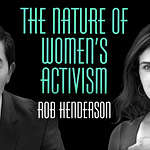Some topics covered:
The recent viral tweet in which a young woman posted a photo of herself graduating with a PhD from Oxford, and why this attracted so many negative comments
Why attractive, educated women trigger rage in a certain type of guy
College as a modern matchmaking system — the “hidden marriage market” filtering for IQ, personality, ambition, and income
Why, even without a PhD, a smart, conscientious woman like this Oxford grad would never end up dating the bitter guys attacking her
Louise gives a steelman argument for why higher education might be a misplaced use of time for many people, especially women
A shift in assortative mating, where some college educated women marry men with less formal education but higher earnings (e.g., men in high-skill trades)
Roy Baumeister’s idea of erotic plasticity: men’s sexuality is more fixed by nature, while women’s is more flexible and reactive to culture and context
Whether the rise of bisexual identity among Gen Z women is partly a coping strategy: if men disappoint, women will widen their pool of potential mates
How the decline of old forms of discipline (e.g., corporal punishment) for boys, along with the rise of social media, fuel a culture where struggling men blame women for their own failures
Thinking about when I was in my teens and early twenties when fist fights were still relatively common. My guy friends and I talked a lot about women as young guys tend to do, but it was never really resentful or bitter the way you hear from incel types now. Maybe a bit of violence is necessary to remind guys that however bad things are, getting randomly punched in the head or getting a ball tap or shot in the forehead with an airsoft gun is worse
How social media dissolves social boundaries, forcing insecure men and high-achieving women into contact when, in real life, they’d never cross paths
Men say they don’t care about a woman’s degree yet tend to date women with the same level of education as themselves. Women say they don’t care about a man’s looks yet tend to date men at the same level of attractiveness as themselves
Is it wise to suppress discussion of group differences to stop people from sliding into crude stereotypes?
I push on a paradox: righties, particularly online, say they believe in social hierarchy and inequality of ability, yet they’re weirdly egalitarian about thinking everyone will arrive at the same policy conclusions as themselves with regard to findings from behavioral genetics
What happens when people notice group disparities but have no honest explanation: they end up blaming differences in group outcomes on “corrupt elites,” “rigged systems,” or ethnic conspiracies (e.g., white people/Jews/whoever are rigging the system in their favor)
There’s no perfect path: if you talk openly about group differences, you risk fueling bigotry; if you suppress them, you risk paranoia and scapegoating
A reminder that paid subscribers can access these recordings on Apple Podcast and Spotify













